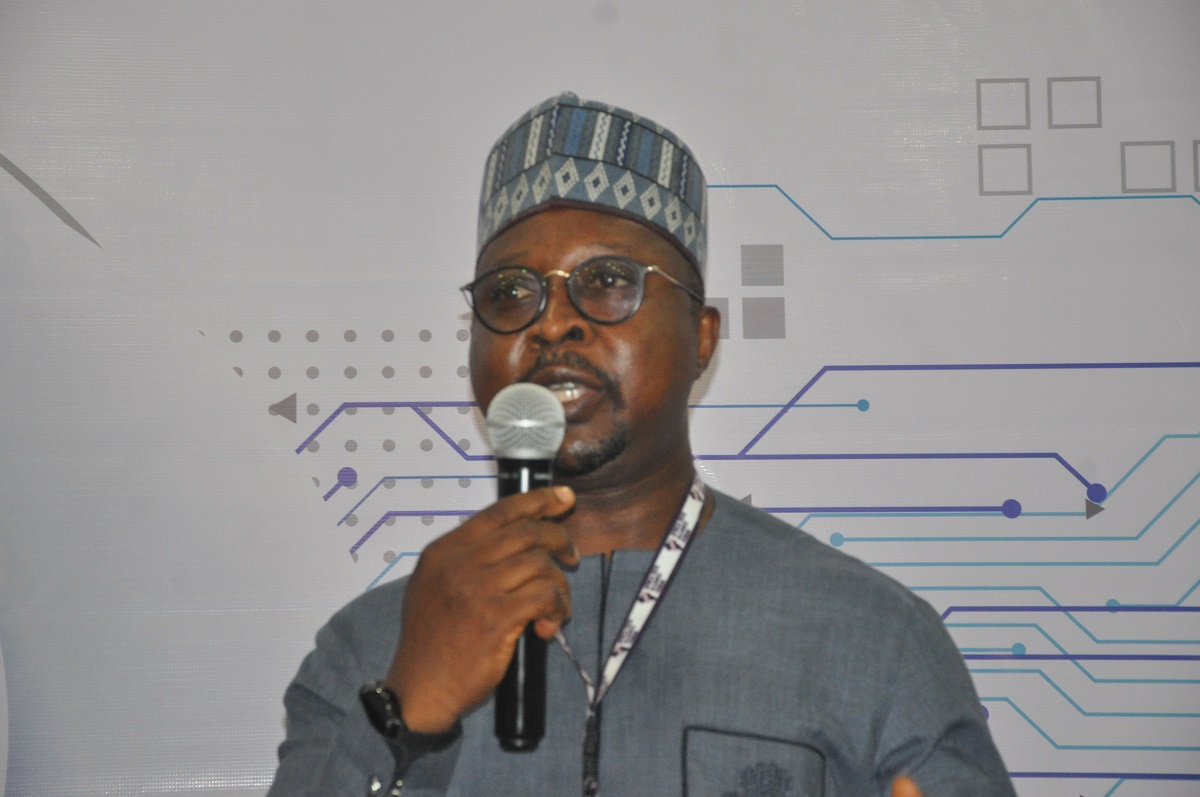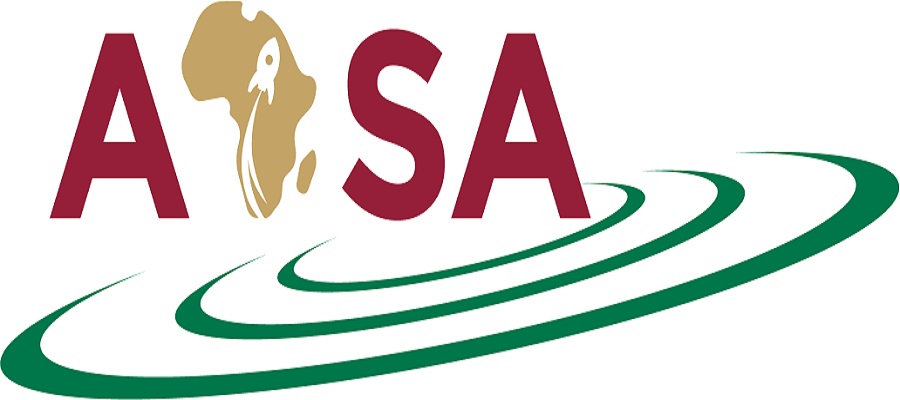Telecom
#AfriTECH2021: Galaxy Backbone Determined to Boost Cloud Infrastructure – Abukakar

Prof. Muhammed Abukakar, managing Director and CEO, Galaxy Backbone Limited, has expressed the company’s preparedness to provide ICT infrastructure and services to public institutions and the underserved communities in Nigeria.

Timi Fadeyi, head DataCentre at Galaxy Backbone
Galaxy Backbone is a public enterprise of the Federal Government of Nigeria incorporated in 2006 with the primary mandate of setting up and operating a unified Information and Communication Technology (ICT) infrastructure platform that addresses the connectivity, transversal and other technology imperatives for Ministries, Departments and Agencies (MDAs) of the Federal Government.
Abukakar was speaking on ‘Boosting Cloud Infrastructure for Digital Economy via Partnerships’ through a representative, Mr. Timi Fadeyi, head DataCentre at Galaxy Backbone Limited, at the (hybrid) Africa Tech Alliance Forum (AfriTECH2021) organised by TechEconomy.ng in Lagos (Nigeria) recently.
The Managing Director while streamline digitisation aligned with Bill Mcdermott SAP CEO who said: “Complexity is an obstacle to digitisation. To get the most out of the new world of digital business, you have to run SIMPLE.”
The trend of the new world
He said that the trends of the new world include hyper-connectivity, cloud computing, a smarter world and cybersecurity. These can be considered as four pillars necessary to drive digitalisation using infrastructure which will be used to service the community.
The realities of the digital economy as outlined by Abukakar the undeniable facts that digital economy is real and here to stay; “you have to embrace, innovate and thrive through it”.
He told the participants that reimagining your organisation cannot be overemphasised in this era.
“We need to work smarter, faster and simpler – a combination of a hybrid mode of working and harnessing relationships; virtual, physical, both.
“Artificial Intelligence is reshaping value chains, industries, communities, countries and the works entirely. You also need to secure your data; secure your entire digital experience, a combination of technology and you
Accelerators of the digital economy
Continuing, the Galaxy Backbone boss said, “To every action, there’s indeed a reaction. The digital economy keeps growing and transforming”.
Several components influence this growth and Abukakar summarised these thus: “The customer experiment which is driving the changes visible on different platforms; the core business processes on platforms that are smarter, faster and simple; smarter and engaged workforce to prevent different levels of possible disconnections; supplier-partner collaboration has never been this critical for an enhanced digital economy; and cloud harnessed Internet of Things and assets to drive real-time insights and new business initiatives.
He also said that cloud investments must be channeled right to enable an increase in revenue
The cloud and the digital economy
“The cloud is the preferred ‘currency’ for digital transformation and for reducing the initial cost of ICT infrastructure acquisition.
“Cloud computing is gradually reducing the downtime in public service delivery, increasing government and citizen engagement. It enables agility, flexibility, connectedness and the opportunity to scale your business”, he added.
Abubakar noted that with the help of the Ministry of Communities and the Digital Economy led by Prof. Isa Pantami and support from the National Information Technology Development Agency (NITDA) and the National Communications Commission (NCC), Galaxy Backbone is well-positioned to provide ICT infrastructure in a way that both parties — governments, institutions, NDAs among others can benefit.
Meanwhile, he said that the pillars that drive the mission of Galaxy Backbone include; to becoming the leading enabler of digital inclusion in Africa: Provides state of the art digital infrastructure and services for a digital Nigeria; to align its operations with government priorities; promote data sovereignty and security of government data, amongst others.
“Galaxy Backbone improves long-term financial sustainability, customer satisfaction, improve satisfaction, adoption and confidence in digital services
“Enhancing the digital economy through partnership, GBB provides its data services from two major locations including Abuja and Enugu. Data lost at one centre can be recovered at the other. This can be described as a data continuity solution”, he said.
According to Abukakar, data sensitivity determines which data centre to be used. This can be a virtual data centre, computing pool, resource pool; storage resource pool, elastic cloud server, among others.
“Economies of scale is an important factor to be considered that allows you to save a lot while running your own infrastructure,” he concluded.
Telecom
MTN Nigeria Drags 20 Banks to Court over N6Bn Debt by SleekChip

MTN Nigeria has taken legal action against more than 20 banks as it intensifies efforts to recover nearly ₦6 billion in interconnect debt from SleekChip Technologies Limited, a licensed international direct access and transit service provider.

Karl Toriola, chief executive officer, MTN Nigeria
This move comes on the back of a court judgment awarding the telecom giant the right to reclaim funds owed through garnishee proceedings.
The Federal High Court in Abuja, presided over by Justice Peter Lifu, ruled in November 2024 that SleekChip must pay MTN $1.97 million—or its naira equivalent at the Central Bank of Nigeria’s official rate at the time.
The court also granted interest on the debt at a rate 2% above the Nigerian Interbank Offer Rate, backdated to January 31, 2022, until full repayment is made.
At the heart of the dispute lies a 2019 interconnection agreement between MTN and SleekChip, which permitted the exchange of calls and messages between their networks.
MTN alleged that from January to October 2022, SleekChip accumulated significant unpaid charges.
Despite repeated demand notices and a formal acknowledgment of debt by SleekChip in May 2023, no repayment was made.
With the judgment in hand, MTN has proceeded to enforce it by seeking court orders to freeze and seize SleekChip’s funds held across Nigerian banks.
The telecom operator pegged the naira value of the judgment debt at over ₦3.28 billion based on the exchange rate of ₦1,665.84 to the dollar as of November 7, 2024, with interest claims pushing the amount beyond ₦5 billion.
Court records show that on May 16, 2025, representatives from MTN and several banks appeared before Justice Lifu.
MTN submitted that most banks had filed affidavits disclosing the status of any accounts held by SleekChip.
The court subsequently discharged over 10 banks that confirmed they had no financial ties to the debtor.
Some banks raised objections to MTN’s request to extend searches using the debtor’s BVN, arguing that the court had issued no such order. The court has scheduled the next hearing for June 26, 2025, to continue the garnishee proceedings.
This case adds to a growing list of MTN’s debt recovery efforts across Nigeria’s telecom sector. In 2023, the Nigerian Communications Commission (NCC) approved MTN’s request to disconnect several service providers over similar unpaid interconnect charges—including SleekChip and Exchange Telecommunications.
The ongoing legal enforcement signals MTN’s strategic shift toward reclaiming debts through court-backed recovery rather than relying solely on regulatory pressure.
With mounting operational costs and network expansion demands, telecom operators are becoming less tolerant of defaults, especially in interconnect fee obligations.
Telecom
Africa Launches First Continental Space Agency

Africa has launched its first continental space agency to enhance Earth observation and data sharing at a time when a more challenging global environment is restricting access to climate and weather information.

The African Space Agency was inaugurated last month under the African Union’s umbrella and is based in Cairo.
Currently in the process of establishment and recruiting key personnel, the agency will oversee coordination of existing national space programs.
Its goal is to strengthen the continent’s space infrastructure by deploying satellites, installing weather stations, and ensuring data sharing across Africa and beyond.
“Space activities across the continent have been very fragmented,” explained Meshack Kinyua, a space engineer and experienced African space policy expert who now leads capacity-building at the agency.
“The African Space Agency introduces a coordination framework and economies of scale — it places all African Union members on an equal footing regarding access to gathered data based on their needs.”
Africa is the poorest continent globally, and its people are among the most vulnerable to extreme weather events worsened by climate change, despite contributing far less to global warming than those in developed nations.
The absence of high-resolution weather and climate data hinders governments from warning citizens about approaching extreme weather, and scientists cannot accurately forecast long-term trends because their models lack detailed data.
The African Space Agency represents a move toward changing this, Kinyua said.
The agency also seeks to expand some successful projects across the continent, such as early warning systems for fishermen in West Africa and the Congo River Basin, he added.
Though long planned, the agency’s launch comes shortly after the Trump administration dismantled the US Agency for International Development (USAID), which had been a major funder of various programs in Africa.
When 80% of USAID’s projects were canceled, initiatives like SERVIR—a joint effort by USAID, NASA, and space organizations in developing countries to address climate change, food security, and natural disasters—were among those affected.
“We need to ensure that African satellites can improve measurements and fill data gaps,” Kinyua stated.
“These gaps will always exist, so we must fill some ourselves and collaborate with other agencies.”
The African agency has already partnered with the European Space Agency to train experts and exchange knowledge, including in data processing and satellite construction.
In Europe, national space agencies share the costs of launching new Earth observation satellites, which can reach up to €800 million ($897 million), said Benjamin Koetz, head of the long-term action section at the European Space Agency. Countries also share the data gathered by these satellites.
“Not every country needs to invest in and build the same satellite,” Koetz explained.
Cairo launched Africa’s first satellite in 1998, and since then, over 20 African nations have established their own space agencies.
Eighteen of these countries have launched a combined total of 63 satellites.
The African Union plans to fund the African Space Agency on a project-by-project basis.
“Securing financial resources is a challenge because there is so much to accomplish, and our resources are limited,” Kinyua explained.
“However, we must take small steps before we can start running.”
Africa’s early space leaders — including Nigeria, Egypt, and South Africa — took a considerable amount of time to establish their agencies and become operational because they had to begin from the ground up, noted Danielle Wood, an associate professor and director of the Space Enabled Research Group at the Massachusetts Institute of Technology.
“It shouldn’t take that long anymore since many African countries now have space experience, and ideally, new countries can learn from existing examples and collaborate to move faster,” she added. “While other players like the US and Europe will pursue their own interests, the African Space Agency will remain focused on Africa, so it should support every country on the continent.”
Telecom
Minister Decries High Rate of Nigerian Women Access Gap to Smartphones

Bosun Tijani, Minister of Communications, Innovation and Digital Economy, has revealed that at least 68% of Nigerian women lack access to smartphones, a barrier that limits their participation in the digital economy and access to essential online services.

Tijani revealed this during a press briefing in Abuja to mark the 2025 World Telecommunication and Information Society Day (WTISD), observed every year on May 17th.
Represented by Adeyemo Olugbenga, Director of the National Frequency Management Council Secretariat, Tijani emphasised that as Nigeria fast-tracks its digital transformation, it remains committed to inclusivity, ensuring that no one, particularly women and girls, is left behind.
The Minister reaffirmed the government’s commitment to equipping 70% of Nigerian women and girls with advanced digital skills by 2027.
He also revealed that the government is collaborating with the African Development Bank (AfDB), the World Bank, and private investors to offer grants and low-interest loans to women-led tech startups, supporting inclusive growth in the digital sector.
Represented by Adeyemo Olugbenga, Director of the National Frequency Management Council Secretariat, Tijani emphasised that the digital revolution can only be truly transformative if it is inclusive.
He stressed the importance of building a future where gender equality is not just an aspiration but a lived reality.
While acknowledging Nigeria’s progress in achieving 46.2% broadband penetration, he noted that the digital economy goes beyond infrastructure and innovation; it is ultimately about people.
He warned that when half the population continues to face barriers to access, skills, and leadership in technology, the nation is not only failing its women but also undermining its overall potential.
The Minister emphasized that achieving gender equality in the digital age cannot rest solely on the shoulders of government.
He urged the private sector to play a pivotal role by adopting gender-responsive hiring practices, investing in women-led tech hubs, and implementing workplace policies that empower women.
Highlighting the government’s commitment to inclusive digital growth, he noted that the ministry has launched several key programmes and initiatives aimed at fostering broad-based participation in the digital economy.
Among these is the National Gender Digital Inclusion Strategy (NGDIS) 2004–2077, designed to create safe online spaces for women and support their advancement in technology-driven sectors.
In terms of skills development, the minister pointed to the expansion of impactful programmes such as the 3 Million Technical Talents (MTT) initiative, the Nigeria Artificial Intelligence Research Scheme, Digital Nigeria, and efforts to strengthen local content and capacity.
Recognising the growing need for online safety, he added that the ministry is actively enhancing cybersecurity and anti-harassment frameworks to better protect women in digital spaces.
He also stressed the importance of challenging gender stereotypes by encouraging young girls to pursue Science, Technology, Engineering, and Mathematics (STEM) education from an early age.
Tijanii called on civil society organisations and the media to amplify the achievements of women in tech and hold decision-makers accountable for inclusive policy implementation.
Speaking on the theme of this year’s World Telecommunication and Information Society Day, “Gender Equality in Digital Transformation,” the minister described it as both timely and essential.
He warned that when women and girls are excluded from accessing technology, acquiring digital skills, or leading in tech sectors, it is not just their potential that is stifled—but the world’s.
The minister reaffirmed the significance of WTISD, which serves as a platform to raise global awareness about the transformative power of ICTs.
He noted that digital innovation, such as leveraging artificial intelligence to combat climate change and eradicate poverty, holds immense promise in addressing some of the world’s most urgent challenges.

 E-Financial3 days ago
E-Financial3 days agoAccess Holdings Sets Benchmark in Fraud Prevention With ₦193.5Bn Tech Investment

 E-Financial3 days ago
E-Financial3 days agoMTN’s Digital Lending Arm Disburses $592m Loans in Q1

 E-Financial3 days ago
E-Financial3 days agoAccess Bank, Deloitte Partner to Equip SMEs with Tools for Growth

 E-Financial3 days ago
E-Financial3 days agoFG Verifies 2m Households for Cash Transfer

 News3 days ago
News3 days agoSERAP Asks Ojulari, NNPC CEO to Account for Missing N500Bn or Face Legal Action

 E-Business3 days ago
E-Business3 days agoFG Launches Online Citizenship, Business Management Platform

 Telecom3 days ago
Telecom3 days agoEquinix Expands Digital Footprint in Nigeria with Launch of LG2.3 Data Center

 General News3 days ago
General News3 days agoNOTAP Urges South Eastern Entrepreneurs to Embrace Franchising as Business Model



























